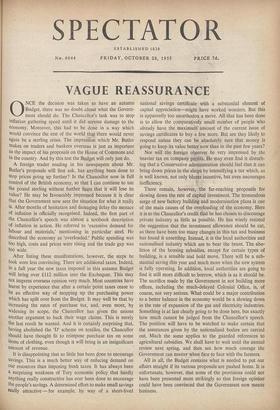VAGUE REASSURANCE
0 NCE the decision was taken to have an autumn Budget, there was no doubt about what the Govern- ment should do. The Chancellor's task was to stop inflation gathering speed until it did serious damage to the economy. Moreover, this had to be done in a way which would convince the rest of the world that there would never again be a sterling crisis. The impression which Mr. Butler makes on traders and bankers overseas is just as important as the impact of his proposals on the House of Commons and in the country. And by this test the Budget will only just do.
A foreign trader reading in his newspapers about Mr. Butler's proposals will first ask, has anything been. done to Stop prices going up further? Is the Chancellor now in full Control of the British economy, so that I can continue to use the pound sterling without further fears that it will lose its Value? He may be favourably impressed because it is clear that the Government now sees the situation for what it really is. After months of hesitation and damaging delay the menace of inflation is officially recognised. Indeed, the first part of the Chancellor's speech was almost a textbook description of inflation in action. He referred to 'excessive demand for labour and materials,' mentioning in particular steel. He described the economy as 'overloaded.' Public spending was too high, costs and prices were rising and the trade gap was too wide.
After listing these manifestations, however, the steps he took were less convincing. There are additional taxes. Indeed, in a full year the new taxes imposed in this autumn Budget will bring over £112 million into the Exchequer. This may not impress overseas opinion very much. Most countries have learnt by experience that after a certain point taxes cease to be an effective way of mopping up the purchasing power which has spilt over from the Budget. It may well be that by increasing the rates of purchase tax, and, even more, by widening its scope, the Chancellor has given the unions another argument to back their wage claims. This is surely the last result he wanted. And it is certainly surprising that, having abolished the 'D' scheme on textiles, the Chancellor should have thought fit to reimpose purchase tax on some items of clothing, even though it will bring in an insignificant amount of revenue.
It is disappointing that so little has been done to encourage savings. This is a much better way of reducing demand on our resources than imposing fresh taxes. It has always been a surprising weakness of Tory economic policy that hardly anything really constructive has ever been done to encourage • the people's savings. A determined effort to make small savings really attractive — for example. by way of a short-lived national savings certificate with a substantial element of capital appreciation—might have worked wonders. But this is apparently too unorthodox a move. All that has been done is to allow the comparatively small number of people who already have the maximum amount of the current issue of savings certificates to buy a few more. But are they likely to respond unless they can be absolutely sure that money is going to keep its value better now than in the past few years?
Nor will the foreign observer be very impressed by the heavier tax on company profits. He may even find it disturb- ing that a Conservative administration should feel that it can bring down prices in the shops by intensifying a tax which, as is well known, not only blunts incentive, but even encourages inefficiency.
There remain, however, the far-reaching proposals for slowing down the rate of capital investment. The tremendous surge of new factory building and modernisation plans is one of the main causes of the overloading of the economy. Here it is to the Chancellor's credit that he has chosen to discourage private industry as little as possible. He has wisely resisted the suggestion that the investment allowance should be cut, as there have been too many changes in this tax and business has found it unsettling. Instead, it is the local authorities and nationalised industry which are to bear the brunt. The abo- lition of the housing subsidies, except for certain types of building, is a sensible and bold move. There will be a sub- stantial saving this year and much more when the new system is fully operating. In addition, local authorities are going to find it still more difficult to borrow, which is as it should be. The sacrifice made by the Government in not building more offices, including the much-delayed Colonial Office, is, of course, not very serious. What could be a major contribution to a better balance in the economy would be a slowing down in the rate of expansion of the gas and electricity industries. Something is at last clearly going to be done here, but exactly how much cannot be judged from the Chancellor's speech. The position will have to be watched to make certain that the assurances given by the nationalised bodies are carried out. Much the same applies to the guarded references to agricultural subsidies. We shall have to wait until the annual review next spring, and then see how much courage the Government can muster when face to face with the farmers.
All in all, the Budget contains what is needed to put our affairs straight if its various proposals are pushed home. It is unfortunate, however, that some of the provisions could not have been presented more strikingly so that foreign opinion could have been convinced that the Government now means business.


































 Previous page
Previous page